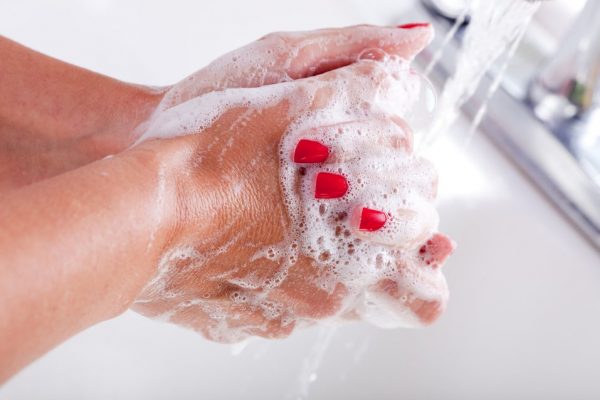In the restrooms of airports, movie theatres and restaurants, I’m usually the slowest handwasher there. Too often, while I’m soaping up, humming, rub-a-dub-dubbing and rinsing, others next to me are barely wiping their hands before heading out the door.
The first week of December is National Hand Washing Awareness Week, promoting awareness of the importance of the handwashing in preventing the spread of infection.
Using an effective hand washing technique at key times during your day is absolutely the MOST effective way to reduce diarrhea, colds and viral illnesses of all kinds in yourself and your family, as well as in your community.
According to the U.S. Centers for Disease Control and Prevention (CDC), only 31 % of men and 65% of women wash or sanitize their hands after using a public restroom, and healthcare personnel practice hand hygiene only about half as frequently as we should. Yikes! When it comes to performing this vitally important skill to protect our health, many of us could really use an upgrade.
How should you wash your hands?
First, you have a choice between hand soap or hand gel or sanitizer. Which one is best? That depends. Unless your hands have dirt, visible soil or grease on them, you can effectively wash or sanitize your hands using either soap and water or an alcohol-based gel or foam, as long as the alcohol gel or foam contains at least 65-70% alcohol. If your hands are dirty or greasy, washing them with soap and water is more effective than using gel or foam.
In health care settings like clinics, hospitals and nursing homes, using alcohol-based hand rubs for hand hygiene is strongly encouraged because they are more convenient to use and when used properly, they can kill bacteria more effectively and quickly than washing with soap and water. Alcohol based hand gels are also less irritating to the skin than soap and water, which is important because health care workers need to wash their hands frequently during each shift as they care for their patients.
Do you need an antibacterial soap? No! The key to effectively cleaning your hands is removing bacteria and viruses from their surface by using friction and then rinsing them away, not by attacking them with a chemical.
Personally, I avoid antibacterial soap because my hands break out in red, itchy welts from my allergy to triclosan, a common ingredient in liquid antibacterial soaps like Dial® and Softsoap®. When I travel, I always pack a small squeeze bottle of shampoo with me to use instead of the industrial-strength antibacterial soaps common in airport and restaurant restrooms.
What’s most important is HOW you wash your hands. You should rub the soap or alcohol gel over every surface of your hands, including your fingertips, fingernails, and between your fingers, for at least 15 seconds.
One strategy to keep you rubbing long enough is humming a catchy song that takes 15-20 seconds to complete while you rub the soap or gel around your hands in a systematic pattern, covering their tops, palms, between your fingers, fingertips and fingernails. One verse of a song like Freres Jacques, The Itsy-Bitsy Spider, or two verses of shorter songs like Happy Birthday, the Alphabet Song, or Row, Row, Row Your Boat all last about 15-20 seconds. My own personal favorite is The Itsy-Bitsy Spider.
Passing on this vital personal skill is easier now than ever, with plenty of free information available online to help teach effective hand-washing technique to your children and grandchildren.
Here are 6 Key Strategies for Effective Handwashing:
- Do it frequently.
Wash or sanitize your hands BEFORE eating, BEFORE and AFTER caring for loved ones who are ill, AFTER using the bathroom, handling animals or pets, and sneezing or wiping your eyes or nose.
- Check the label.
For effectiveness, make sure the alcohol-based hand gel you buy and use contains at least 65-70% alcohol.
- Rub your hands thoroughly.
Make sure you are rubbing soap or gel over EVERY surface of your hands, especially all of your fingertips and fingernails.
- Don’t skimp on hand gel.
Many people swipe hand gel around and that’s it. Apply enough gel so that it takes about 15 seconds to dry completely.
- Sing a song.
Sing or hum a catchy song that lasts for at least 15 seconds while you wash your hands. It helps kids learn effective handwashing and keeps you (and them) from stopping too soon.
- Antibacterial soap is not required.
Effective handwashing or sanitizing depends on using good technique, not on wiping with soap that contains an antibacterial chemical.



